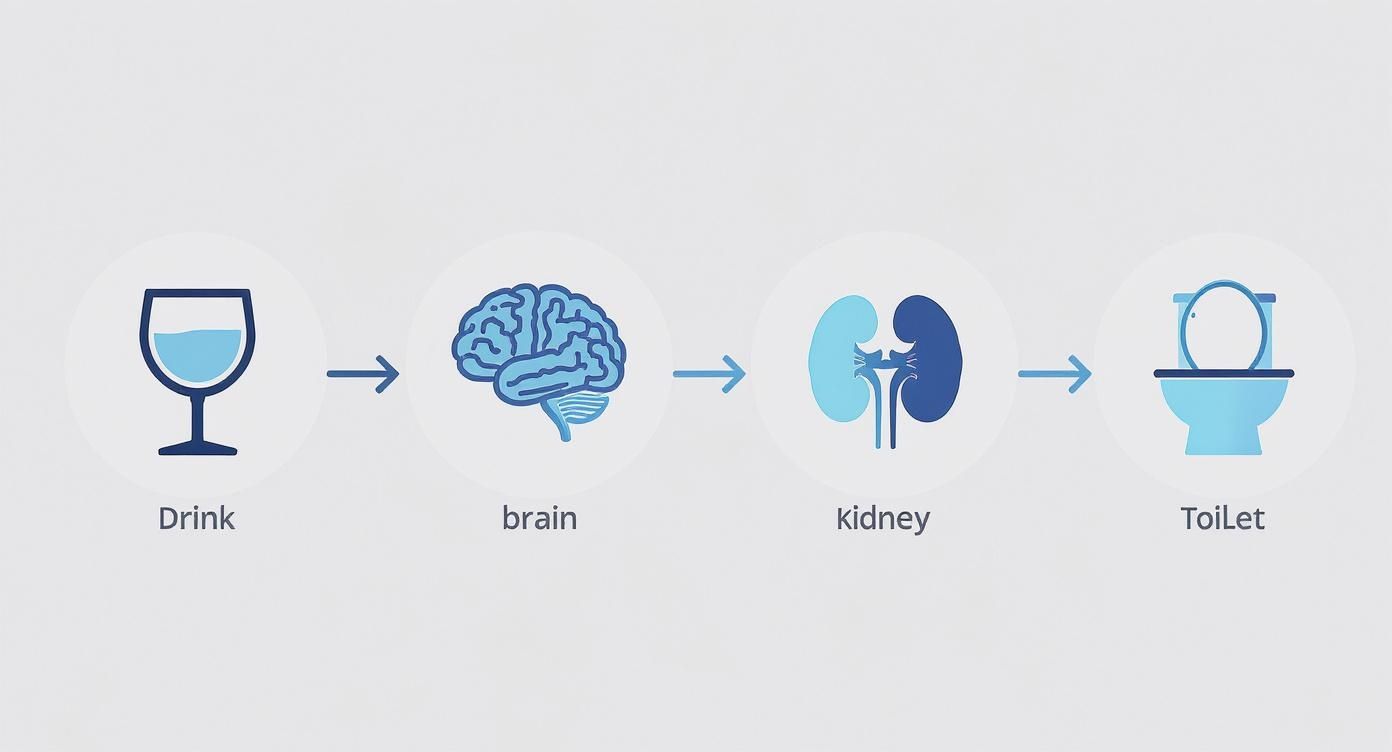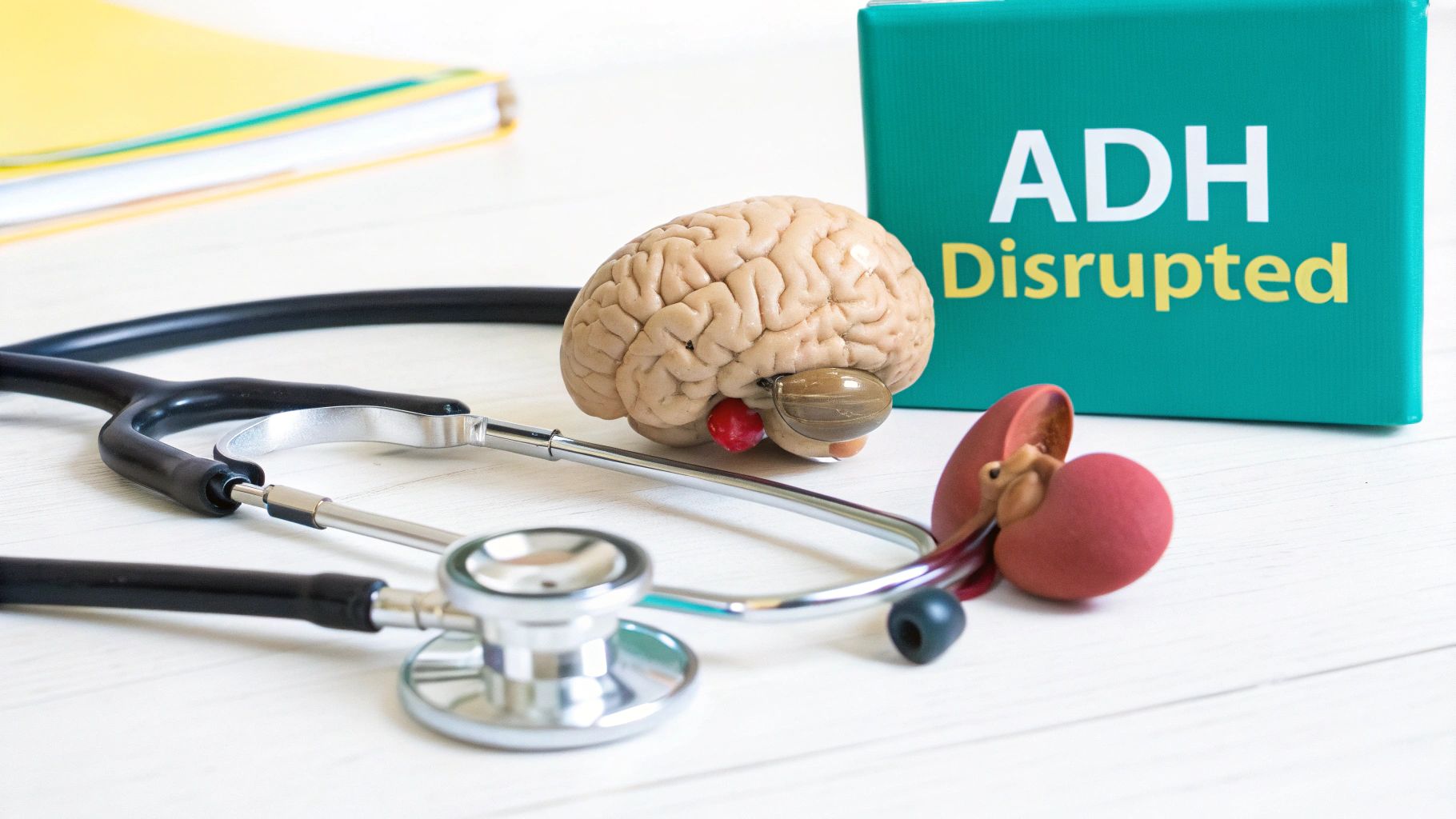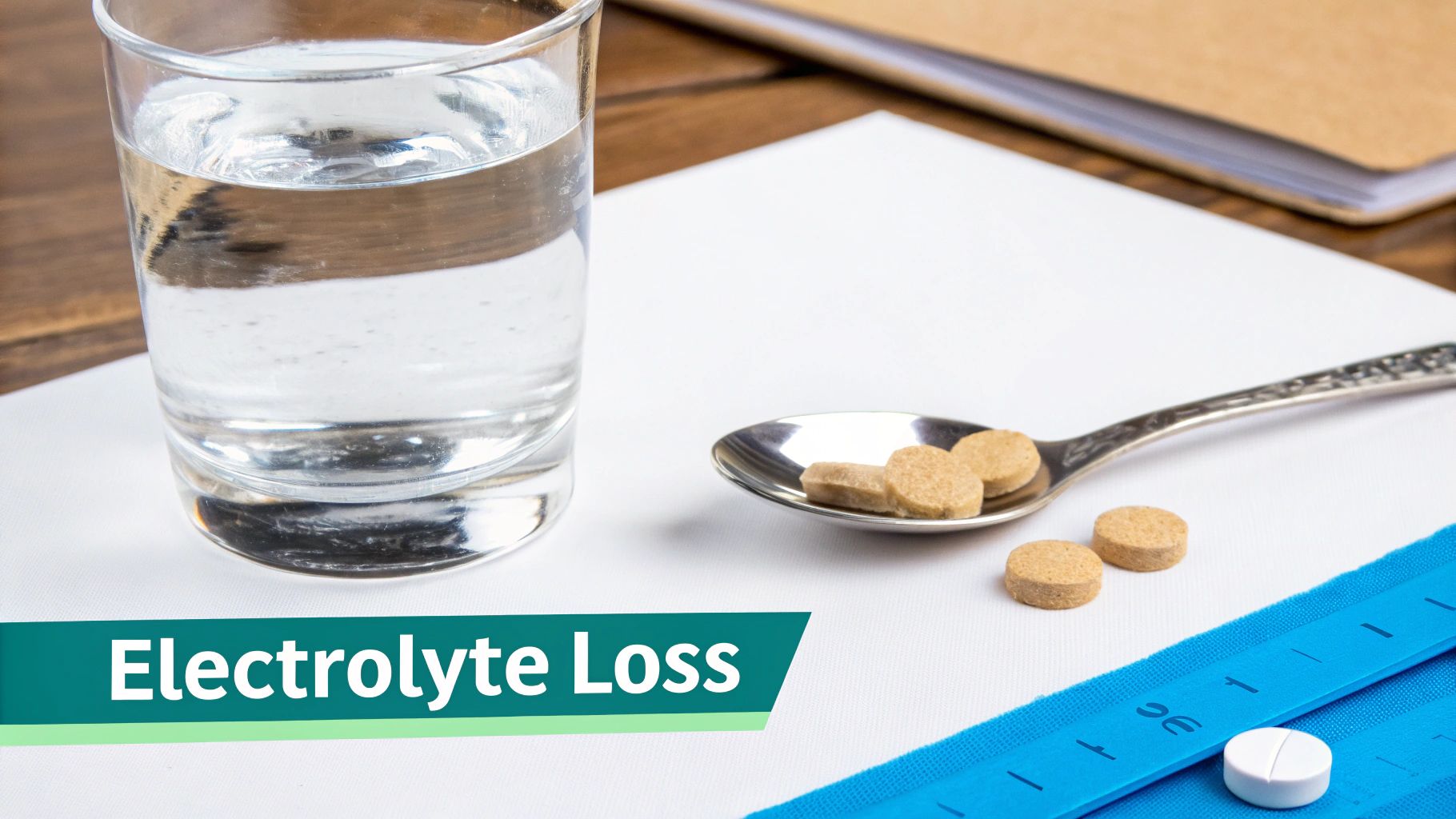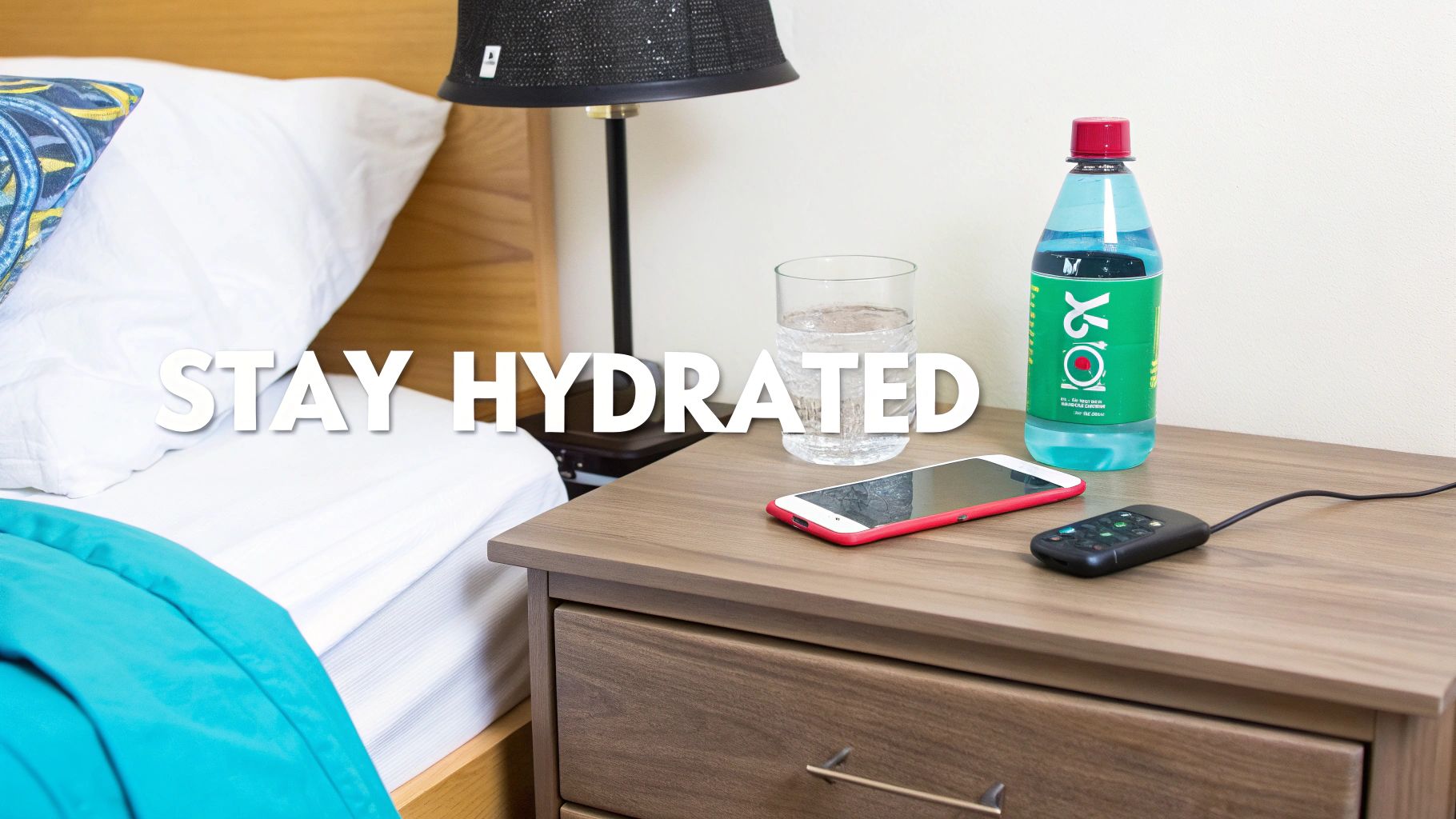

· By Annemarie
Why Does Alcohol Make You Dehydrated
We’ve all heard it: drinking alcohol dries you out. But what's actually happening inside your body when a few cocktails lead to a parched morning-after? It’s not just about the liquid you’re not drinking; it’s about how alcohol actively tells your body to get rid of the water it already has.
This process is why alcohol is known as a diuretic—it makes you pee more. This rapid fluid loss is a major player in why you feel so lousy after a night out.
The Science of Alcohol and Dehydration
To really get what's going on, you have to look at how alcohol messes with your body's finely tuned water management system.
Think of your body like a reservoir, with a special hormone called antidiuretic hormone (ADH) acting as the gatekeeper. ADH’s job is simple: it tells your kidneys when to conserve water and when to let it go. It’s the master controller of your hydration levels.
When you have a drink, alcohol hitches a ride in your bloodstream straight to your brain. There, it directly interferes with the pituitary gland—the command center that releases ADH. Alcohol essentially slams the brakes on ADH production.
The Hormonal Chain Reaction
Without enough ADH calling the shots, your kidneys get the wrong message entirely. Instead of reabsorbing water to keep you hydrated, they go into overdrive, sending that precious fluid straight to your bladder. This hormonal mix-up is the reason for all those extra trips to the restroom.
And it happens fast. The diuretic effect can kick in within just 20 minutes of your first drink. One study found that drinking a beer with 5% alcohol caused a significantly greater increase in urine output than an isotonic sports drink did. You can dive deeper into the full study about alcohol's diuretic properties if you want the nitty-gritty details.
Here's a quick look at that chain reaction:

How Alcohol Triggers Dehydration
This table breaks down the immediate chain reaction alcohol sets off in your body's hydration system.
| Step | What Happens in Your Body |
|---|---|
| Step 1: You Drink | Alcohol enters your bloodstream and travels to the pituitary gland in your brain. |
| Step 2: Hormone Block | Alcohol suppresses the release of the antidiuretic hormone (ADH). |
| Step 3: Kidneys Overreact | With no ADH to guide them, the kidneys start flushing water directly to the bladder instead of reabsorbing it. |
| Step 4: Dehydration | Your body loses more fluid than it takes in, leading to dehydration and the start of hangover symptoms. |
The most important thing to remember is that this whole process starts in the brain, not the bladder. It shows just how system-wide alcohol's effects really are.
Key Takeaway: The main reason alcohol causes dehydration is because it blocks the antidiuretic hormone (ADH). This tricks your kidneys into flushing out way more water than they should, creating a fluid deficit that’s a perfect recipe for a hangover.
How Alcohol Disrupts Your Body's Water Balance
To get why alcohol leaves you feeling so parched, you have to understand the powerful connection between your brain and your kidneys. Think of it like a direct hotline they use to keep your body's water levels perfectly balanced. The key messenger on this line is a hormone called antidiuretic hormone (ADH), also known as vasopressin.
When you're hydrated, your brain's pituitary gland sends out ADH with a clear message for your kidneys: "Hey, hold on to water, we need it!" This signal makes sure your body reabsorbs fluid, keeping everything in a healthy equilibrium.
But alcohol? It's like a burst of static on that hotline, completely scrambling the message.

The Hormone Hijack
The moment alcohol hits your bloodstream, it makes a beeline for the pituitary gland. Once it gets there, it actively shuts down the release of ADH. With the main messenger silenced, the communication line to your kidneys goes dead.
Without ADH's instructions, your kidneys never get the memo to conserve water. Instead, they just default to their filtering job and start flushing water straight to your bladder, completely ignoring your body's actual hydration status. This hormonal sabotage is the real reason you're running to the bathroom more often when you drink.
It all happens faster than you think. Research shows alcohol’s diuretic effect can kick in within just 20 minutes of your first drink, starting a rapid loss of essential fluids.
This is how a liquid that seems hydrating actually does the opposite. For every 200 ml of beer you drink (that's about two-thirds of a can), your body can flush out as much as 320 ml of water. You're losing more fluid than you're taking in, which is why even watery drinks like beer still lead to dehydration.
The Dehydration Downward Spiral
This disruption throws your whole system out of whack. It's not just about losing the water from your drink; your body starts pulling from its existing reserves to keep up with the kidneys' misguided flushing. This is what sets the stage for those all-too-familiar symptoms of dehydration:
- Intense Thirst: Your body’s screaming for water because its reserves are dangerously low.
- Dry Mouth and Skin: A classic sign that there isn't enough fluid to go around for your body's tissues.
- Fatigue and Sluggishness: Your cells need water to create energy. When they don't have enough, you feel completely wiped out.
This internal chaos is a huge part of why you feel so drained the next day. The hormone hijack basically turns your own kidneys against your hydration goals, creating a fluid deficit that paves the way for a miserable hangover. Understanding this is the first step to actually fighting back effectively.
Losing water is only half the battle. If you really want to understand why a few drinks can leave you feeling so rough the next day, you need to look past simple fluid loss and focus on the essential minerals getting flushed out right along with it.
We're talking about electrolytes.
Think of your body like a high-performance machine. Water is the coolant, and you absolutely need it to keep from overheating. But electrolytes—minerals like sodium, potassium, and magnesium—are the spark plugs. They’re the electrically-charged minerals that fire up everything from your nerve signals to your muscle contractions.
Every time alcohol’s diuretic effect sends you to the bathroom, you’re losing more than just water. You're also dumping these vital electrolytes, creating a major deficit that a bottle of water alone can't fix. It’s why you can chug water all morning and still feel weak, shaky, and foggy. You might have topped up the coolant, but your spark plugs are shot.
If you want to dive deeper into how these crucial minerals work, check out our guide that explains what are electrolytes and nonelectrolytes.

The Big Three Electrolytes Alcohol Drains
The loss of specific electrolytes is directly tied to some of the absolute worst hangover symptoms. When you’re running low on sodium, potassium, and magnesium, your body’s performance nosedives.
Here’s a quick breakdown of the key players and the trouble they cause when they go missing.
Key Electrolytes Lost and Their Impact
| Electrolyte | Role in the Body | Symptom of Depletion |
|---|---|---|
| Sodium | Maintains fluid balance and supports nerve function. | Fatigue, nausea, and headaches. |
| Potassium | Regulates muscle contractions and heart rhythm. | Muscle weakness, cramps, and fatigue. |
| Magnesium | Aids in energy production and nerve regulation. | Headaches, muscle spasms, and irritability. |
This table really highlights how that drained, achy feeling isn't just in your head—it's a direct result of your body missing the minerals it needs to function.
Why This Loss Magnifies Your Hangover
This electrolyte drain is what turns simple dehydration into a full-blown, day-ruining hangover.
That pounding headache? It’s often linked to a magnesium shortage, since magnesium helps regulate blood vessel constriction in your brain. Those shaky legs and that all-over weakness? That’s your muscles screaming for the potassium they need to fire properly.
Key Insight: A hangover isn't just about dehydration; it's an electrolyte crisis. Trying to fix it by just drinking water is like trying to charge your phone with the wrong cable—you're not giving your body what it actually needs.
This is exactly why any real hangover recovery plan has to focus on putting back both fluids and electrolytes. Your body needs the complete package to restore its balance and get you back on your feet. Without them, you’re stuck fighting an uphill battle against fatigue, headaches, and muscle aches.
Connecting Dehydration to Hangover Symptoms
So, let's connect the dots. We've talked about the science, but how does all this actually make you feel so awful the morning after a few drinks? A hangover isn't some cosmic punishment for having a good time. It’s a completely predictable set of responses to the fluid and electrolyte crisis alcohol kicks off in your body.
When you trace the symptoms back to their roots, it all starts to make sense.
Take that throbbing, relentless headache, for instance. When your body is desperate for water, it’ll pull it from wherever it can—including the tissues in your own brain. This causes your brain to literally shrink and pull away from your skull. That pulling action stretches the sensitive membranes connecting the two, and boom: a monster headache is born.
And that dizzy, exhausted feeling that makes rolling out of bed feel like climbing a mountain? That's a direct result of the internal drought, too. Dehydration actually lowers your overall blood volume, forcing your heart to work overtime just to pump blood to your brain and muscles. Combine that extra effort with depleted electrolytes, and you're left feeling weak, unsteady, and totally drained.
Tracing Symptoms to Their Source
It’s actually pretty wild how many of the worst hangover feelings can be directly linked back to dehydration and electrolyte loss. The connection is much clearer than you might think.
Here’s how a lack of fluids and key minerals shows up as those all-too-familiar hangover symptoms:
- Muscle Aches and Weakness: Your muscles need electrolytes like potassium to contract and work properly. When you flush all that out, your muscles can feel sore, weak, or even start cramping up.
- Nausea and Stomach Discomfort: Dehydration can really slow down your digestion and irritate the lining of your stomach, which is a major contributor to that queasy, unsettled feeling.
- Brain Fog and Irritability: Your brain relies on proper hydration and electrolytes to send clear nerve signals. When you're running low, it leads to that mental sluggishness, an inability to focus, and those classic mood swings.
Key Insight: A hangover is basically your body screaming for help. The headache, the fatigue, the nausea—they're all alarm bells signaling a severe shortage of fluids and essential minerals.
Once you understand these connections, you can stop just suffering through hangovers and start actively preventing them. It’s not about damage control the next day; it’s about addressing the core problem before it ever gets a chance to ruin your morning.
While dehydration is a massive piece of the puzzle, it's not the only factor. For a complete look at all the moving parts, you can learn more about what causes hangovers in our full guide. Getting the science behind why alcohol dehydrates you is the first step toward smarter, healthier habits.
Practical Strategies to Stay Hydrated
Knowing the science behind why booze makes you so thirsty is one thing, but putting that knowledge into practice is another. The good news? You can totally get ahead of alcohol-induced dehydration with a smart, proactive game plan. It’s not about chugging a gallon of water the next morning and hoping for the best.
With a little prep before, during, and after you drink, you can make a huge difference in how you feel.

This isn’t about some magic bullet. It’s about giving your body the support it needs to handle the stress alcohol puts on it. Trust me, a little preparation goes a long, long way.
Before You Start Drinking
The best defense is a good offense, right? Walking into a night out already topped up on fluids gives your body a much-needed buffer against the diuretic freight train that’s coming.
Think of it like filling up your body's reservoir before you know there’s going to be a drain.
A few hours before that first drink, focus on fluids that pack in some electrolytes. These essential minerals are clutch because they help your body actually hold onto water. We’re talking coconut water, a sports drink, or even just a glass of water with a tiny pinch of salt. It makes a bigger difference than you’d think.
During Your Night Out
Once the fun starts, the name of the game is pacing yourself and consciously replacing the fluids you're losing. This doesn't mean you can't have a good time—it just means being a little more mindful.
Here are a few simple but game-changing habits to get into:
- Alternate Your Drinks: This is the golden rule for a reason. For every alcoholic drink, have a full glass of water. It slows you down and actively fights off dehydration in real time.
- Choose Wisely: While all alcohol is dehydrating, the concentration really matters. A 2010 study found that drinks with very low alcohol content (up to 2%) didn’t mess with hydration much, but the impact ramps up from there. You can check out the full findings on alcohol concentration and hydration if you want to get nerdy with it.
- Avoid Sugary Mixers: This is a big one. Syrupy sodas and juices can actually make dehydration worse. Stick with club soda or water as a mixer whenever you can.
Your Post-Drinking Recovery Plan
What you do when you get home is just as critical as what you did while you were out. While you sleep, your body is working hard to recover, and it needs the right tools to do the job. Just chugging plain water isn't going to cut it, because you’ve lost a ton of vital electrolytes.
The Smart Recovery Solution: A targeted approach is always going to be your best bet. Your body isn't just screaming for water; it's desperate for the sodium, potassium, and vitamins that got flushed out. This is where a recovery product like Upside comes in.
Upside's jelly format is specifically formulated to deliver a precise blend of electrolytes and nutrients that help your body rehydrate way more efficiently than water alone. It’s a straightforward way to give your system exactly what it’s craving to bounce back.
For a deeper dive, check out our guide on the best way to rehydrate after drinking. Combine these strategies, and you can actually enjoy your night out without totally writing off your next day.
Burning Questions & Bar Myths
Even with the science laid out, a few common questions—and a whole lot of myths—about drinking and dehydration always seem to pop up. Let's tackle them head-on, so you can make smarter choices on your next night out.
Does the Type of Alcohol I Drink Affect Dehydration?
Absolutely. The concentration of alcohol plays a huge role. Hard liquors and spirits with a higher alcohol by volume (ABV) pack a much stronger diuretic punch per ounce than lower-ABV drinks like beer or wine.
Here’s a simple rule of thumb: for every gram of pure alcohol you drink, your body can push out about 10 mL of extra urine. That means a single shot of whiskey, with roughly 14 grams of alcohol, can trick your body into flushing out an extra 140 mL of fluid. And that’s not even counting the liquid volume of the shot itself! So, while a beer might seem more hydrating because it has more water, its alcohol content still guarantees you'll end up with a net fluid loss.
Can I Just Drink a Ton of Water the Next Day?
Chugging water the next morning is a great start, but it's only half the battle. Alcohol-induced dehydration is a double-whammy: you lose a ton of water, but you also flush out crucial electrolytes like sodium and potassium along with it.
Plain water doesn't have any of these vital minerals. So while you’re technically replacing lost fluids, you're not restoring the electrolyte balance your body desperately needs to get your muscles and nerves firing correctly again.
For a real, effective recovery, you need a solution that gives you back both the water and the electrolytes. This is exactly why people often feel so much better after an electrolyte drink compared to just plain water—it addresses the whole problem, not just part of it.
Is "Breaking the Seal" a Real Thing?
This is one of the most famous drinking myths out there, but it's actually rooted in a real process. No, you don't magically break some kind of urinary floodgate. The truth is way simpler.
By the time you feel that first urge to go, the alcohol has already started messing with your antidiuretic hormone (ADH). The constant trips to the bathroom that follow are just the diuretic effect kicking into high gear. It feels like a sudden event, but it's really a gradual hormonal change that just happens to become super noticeable after that first bathroom break.
How Do Recovery Drinks Actually Help?
A well-made recovery drink, like Upside, is built specifically to counteract the aftermath of drinking. It goes straight for the dehydration problem with a smart blend of key electrolytes—we’re talking Sodium, Potassium, and Magnesium—to quickly put back what you lost.
This helps restore your body's fluid balance way more effectively than water ever could on its own. On top of that, products like Upside usually include other supportive ingredients, like B-Vitamins to help your body process alcohol byproducts and antioxidants to fight off cellular stress. It’s a complete game plan for feeling human again, faster.
Ready to stop letting hangovers run your mornings? Give your body the targeted support it actually needs with Upside. Our expertly formulated hangover jelly sticks are packed with the electrolytes and nutrients your body is begging for after a night out, helping you rehydrate, recover, and live more.
Try Upside and reclaim your mornings today!
#upside #enjoyupside #upsidejelly #livemore #hangovercure #hangoverprevention #fighthangovers #preventhangovers #HangoverRelief #MorningAfter #PartySmarter #HydrationStation #WellnessVibes #RecoverFaster #NoMoreHangovers #HealthyParty #HangoverHacks #FeelGoodMorning #NightlifeEssentials #HangoverFree #SupplementGoals #PostPartyPrep #GoodVibesOnly #HealthAndParty #HangoverHelper #UpsideToPartying
